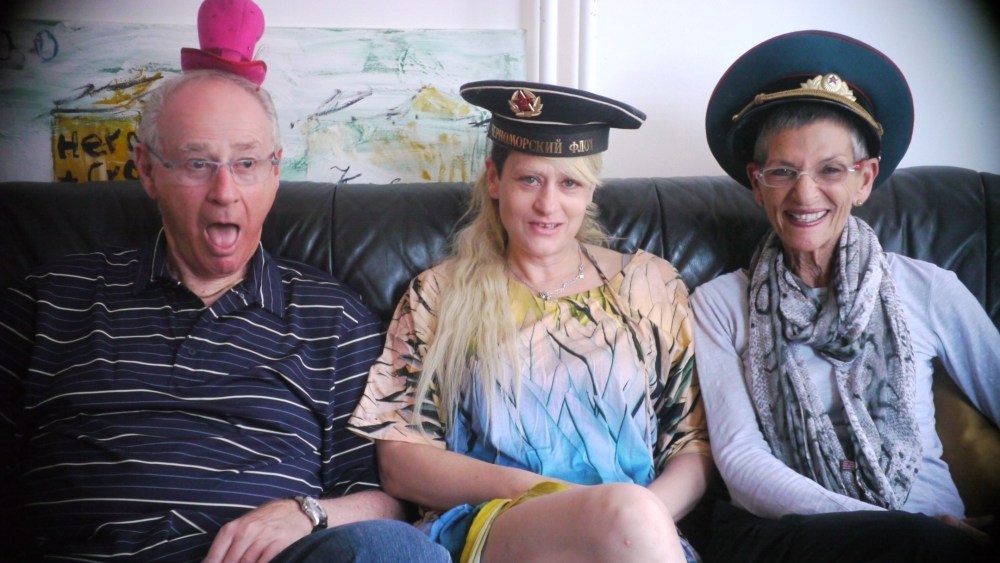Documentary filmmaker Marie Losier and pop icon Merrill Nisker, higher generally known as “Peaches,” started their journey to this yr’s Venice Movie Competition practically 20 years in the past . After an encounter backstage at a present, Losier instinctively turned her Bolex digital camera on the musician – after which did not cease filming for 17 years.
The result’s Peaches Goes Bananas, an intimate and unconventional documentary that premiered on the Venice Days Sidebar.
The mission is the second peach-themed mission to tour this yr’s competition, after Philipp Fussenegger and Judy Landkammer’s “Teaches of Peaches” in Berlin, and the singer sees no overlap.
“These initiatives are very completely different,” Niskel stated sort. “It is extra like a documentary a few sure album at a sure time and place. [whereas] Mary’s movie – properly, I do not even consider it as a documentary. It is extra like a portray, a portrait. Mary will get enthusiastic about an artist after which goes her personal method.
“This movie may be very a lot in regards to the physique and the way the physique can grow to be a murals,” says director Marie Losier. “This film reveals how the physique, throughout a number of phases and ages, can create magnificence. It is a film about utilizing your physique to really feel music.
Filmmakers achieved this impact by taking pictures with handheld movie cameras that have been unable to document sound.
“[Shooting with a Bolex] It’s stuffed with surprises,” Losier stated. “You possibly can’t see what you are taking pictures, so that you keep within the second whereas staying hyper-focused, after which while you get the outcomes you discover every kind of surprises. It is a very completely different mind-set about movie, stuffed with questions and surprises, and I Prefer it very a lot.
“Separating sound from picture is as necessary because the picture itself,” she continues. “You possibly can invent a lot extra when taking pictures with out synchronized sound. It actually opens up a world of creativity.

“Peach turns into banana”
Courtesy Writer Day
The movie delves into the musician’s private archives, offering new insights into Niske’s personal artistic strategy. Lengthy earlier than she turned a Berlin icon, the younger singer taught music to children in Toronto, a course of she likens to a trial by fireplace by which Peaches’ stage presence was solid.
“Audiences wish to really feel a part of the present and really feel like they know one thing you do not,” Niske stated. “They did not – but it surely’s actually thrilling to droop disbelief and it is enjoyable to play it and faux you forgot to play it [their favorite song.] It’s important to discover a option to work together with out them taking up.
Seeing the idol singing nursery rhymes to a decidedly youthful crowd in a very completely different context can also be a option to “distract from the coolness of rock music.”
As a substitute, Lossier focuses on the singer’s relationships together with her dad and mom and sisters, deviating from some Behind the Music conventions and depicting deep love and devotion. However with love comes heartache and loss—components exacerbated by household sickness and the movie’s 17-year shoot.
“Years later, once I appeared again on this video, I noticed the highly effective method Peach stared. [her sister] Suri, that is one thing I did not discover on the time,” Losier stated. “It made the modifying course of very emotional and emotional as a result of I used to be so near it. I wanted to coordinate these feelings to make the movie come to life.
Given the sheer scale of the movie’s manufacturing, the passage of time turns into a key theme – and seeing the artist work together together with his personal dad and mom highlights one among Niskel’s primary issues.
“Intergenerational dialogue and understanding are most necessary proper now,” she stated. “I additionally suppose dad and mom and grandparents are typically extra punk than their children. I imply, they lived by way of the cultural revolution—they perceive the punk angle!”
As a efficiency artist, Peaches hopes to embody this angle.
“[The culture] There’ll at all times be a spot for younger folks to search out their idols,” she stated. “However those that are older are actually saying, I would like mine! We wish this and we have to really feel this fashion. So I’d say [aging and menopause] It is not over but. It’s the beginning of one thing new – and it’s nice. For instance, you do not have to fret about sporting white.

mary loser and peaches

